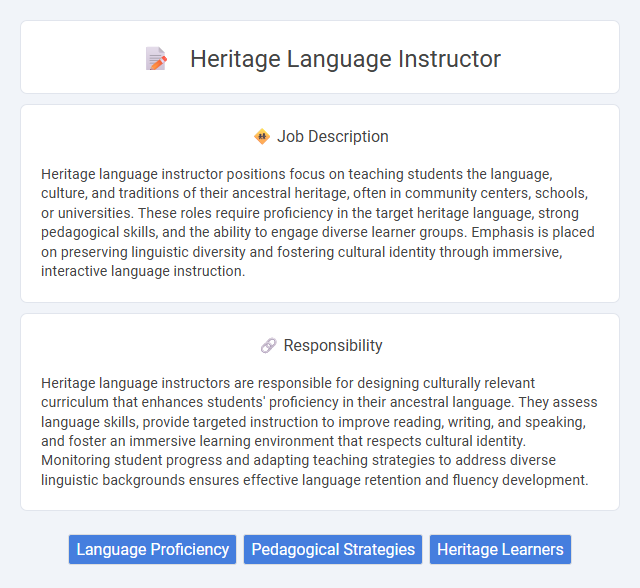
Heritage language instructor positions focus on teaching students the language, culture, and traditions of their ancestral heritage, often in community centers, schools, or universities. These roles require proficiency in the target heritage language, strong pedagogical skills, and the ability to engage diverse learner groups. Emphasis is placed on preserving linguistic diversity and fostering cultural identity through immersive, interactive language instruction.
Individuals with strong bilingual abilities and a deep connection to their cultural heritage are likely well-suited for a heritage language instructor position, as this role requires both linguistic proficiency and cultural understanding. People who enjoy teaching, communicating across generations, and promoting language preservation may find this job fulfilling and compatible with their skills. Those lacking passion for heritage languages or effective teaching methods might face challenges thriving in such a specialized educational environment.
Qualification
Heritage language instructors typically require a bachelor's degree in linguistics, education, or a related field, with specialized training in heritage language pedagogy. Proficiency in the target heritage language, often demonstrated through native or near-native fluency, is essential for effective instruction. Experience working with diverse learner populations and familiarity with culturally responsive teaching methodologies enhance qualifications for this role.
Responsibility
Heritage language instructors are responsible for designing culturally relevant curriculum that enhances students' proficiency in their ancestral language. They assess language skills, provide targeted instruction to improve reading, writing, and speaking, and foster an immersive learning environment that respects cultural identity. Monitoring student progress and adapting teaching strategies to address diverse linguistic backgrounds ensures effective language retention and fluency development.
Benefit
Heritage language instructor positions likely offer significant benefits, including the opportunity to preserve and promote cultural identity while enhancing language proficiency among students. These roles often provide a unique chance to engage with diverse communities, fostering cross-generational communication and understanding. Employment in this field may also include professional growth prospects and a gratifying sense of contributing to cultural preservation.
Challenge
Heritage language instructors likely face the challenge of balancing cultural preservation with modern educational methods to engage diverse learners effectively. They may encounter difficulties in addressing varying proficiency levels within the same classroom while maintaining students' motivation and connection to their heritage. This role probably requires adaptability and cultural sensitivity to overcome these obstacles successfully.
Career Advancement
Heritage language instructors possess specialized skills in teaching students their ancestral languages, which makes them valuable assets in multicultural education settings. Opportunities for career advancement include roles such as curriculum developer, program coordinator, and academic advisor, often supported by gaining advanced degrees or certifications in linguistics and education. Leveraging expertise in heritage languages can also lead to leadership positions within educational institutions or community organizations focused on cultural preservation.
Key Terms
Language Proficiency
Heritage language instructors demonstrate advanced language proficiency, enabling them to teach students with cultural and linguistic backgrounds linked to the target language. They possess native or near-native fluency in speaking, reading, and writing, essential for effective communication and instruction. Mastery of grammar, vocabulary, and idiomatic expressions ensures accurate language transmission and cultural relevance in classroom settings.
Pedagogical Strategies
Heritage language instructors employ specialized pedagogical strategies that incorporate culturally relevant materials and interactive techniques to enhance language retention and fluency among heritage speakers. These strategies often include differentiated instruction tailored to varying proficiency levels, immersive language activities, and the integration of students' cultural backgrounds to foster engagement and authentic communication. Emphasizing oral proficiency, contextual vocabulary, and community-based learning supports the development of practical language skills essential for heritage language preservation.
Heritage Learners
Heritage language instructors specialize in teaching individuals who possess a cultural or familial connection to a language but lack full proficiency, known as heritage learners. These educators employ tailored methodologies that integrate cultural context and familial language nuances to enhance language retention and fluency. Expertise in curriculum design aligned with heritage language acquisition theory is essential for supporting learners' linguistic and identity development effectively.
 kuljobs.com
kuljobs.com